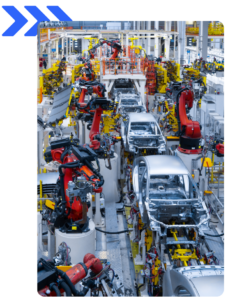
Top Industries That Depend on Metal Fabrication with AMS
April 1, 2025
Choosing the Right Fabrication Partner: 5 Questions to Ask
June 10, 2025In recent years, the concept of reshoring manufacturing—bringing production back to the United States—has gained significant traction. This movement is largely driven by challenges such as global supply chain disruptions, extended lead times, and geopolitical tensions. As a result, many manufacturers are turning to domestic metal suppliers to enhance reliability and efficiency in their operations.
The Shift Toward Domestic Sourcing
The COVID-19 pandemic exposed vulnerabilities in global supply chains, leading to delays and increased costs. Consequently, companies are prioritizing local metal sourcing to mitigate these risks. Collaborating with U.S. metal fabrication firms enables businesses to achieve shorter lead times, improved quality control, and enhanced supply chain resilience.
Benefits of Reshoring 
- Reduced Lead Times: Partnering with short lead time suppliers domestically allows manufacturers to respond swiftly to market demands, minimizing production delays.
- Enhanced Quality Control: Working closely with reliable metal suppliers in the United States ensures adherence to stringent quality standards, resulting in superior custom metal components.
- Supply Chain Resilience: Domestic sourcing minimizes exposure to international disruptions, fostering a more robust and dependable metal supply chain.
- Cost-Effectiveness: While initial costs may be higher, reshoring can lead to long-term savings by reducing expenses associated with extended supply chains and tariffs.
Challenges in the Reshoring Process 
Despite its advantages, reshoring presents certain challenges:
- Skilled Labor Shortage: The U.S. faces a shortage of skilled workers in the manufacturing sector. Addressing this requires investment in workforce development and training programs.
- Regulatory Compliance: Navigating the complex regulatory landscape in the United States can be demanding, necessitating thorough understanding and adherence to local laws.
- Initial Transition Costs: Shifting operations back to the U.S. involves upfront investments in infrastructure and technology, which can be substantial.
The Role of Technological Advancements
Embracing technological advancements is crucial for successful reshoring. Implementing automation, precision metal fabrication, and CNC machining can enhance efficiency and offset higher labor costs. Additionally, adopting advanced manufacturing processes improves product quality and consistency.
Case Studies: Successful Reshoring Initiatives
Several manufacturing companies have successfully transitioned to domestic production:
- Automotive Industry: Companies have moved the production of critical components like stainless steel parts back to the U.S., ensuring better quality control and reducing long lead times.
- Aerospace Sector: Manufacturers have partnered with domestic industrial metal fabrication firms to produce high-precision components, benefiting from shorter lead times and enhanced collaboration.
Future Outlook 
The trend of reshoring is expected to continue, influenced by factors such as:
- Geopolitical Tensions: Ongoing global uncertainties make domestic sourcing a strategic priority.
- Customer Service: Proximity to clients allows for improved communication and responsiveness, enhancing customer satisfaction.
- Supply Chain Management: A focus on supply chain resilience and reducing lead time positions U.S. manufacturers competitively in the global market.
Looking Ahead
Reshoring offers U.S. manufacturers an opportunity to strengthen their operations by collaborating with domestic metal suppliers. While challenges exist, the benefits of enhanced quality, reduced lead times, and supply chain resilience make a compelling case for this strategic shift. By investing in technology and workforce development, American manufacturing solutions can thrive in the evolving global landscape.





